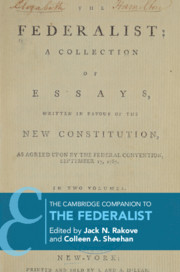Book contents
- The Cambridge Companion to The Federalist
- Other Volumes in the Series of Cambridge Companions to Philosophy
- The Cambridge Companion to The Federalist
- Copyright page
- Contents
- Contributors
- Acknowledgments
- Abbreviations
- Introduction
- 1 Publius and the Anti-Federalists:
- 2 John Jay, The Federalist, and the Constitution
- 3 “A Vigorous National Government”: Hamilton on Security, War, and Revenue
- 4 “The Known Opinion of the Impartial World”
- 5 The Federalist’s New Federalism
- 6 The Political Psychology of Publius
- 7 Montesquieu, Hume, Adam Smith, and the Philosophical Perspective of The Federalist
- 8 Madison’s Republican Remedy
- 9 The Republicanism of Publius
- 10 “The Interest of the Man”: James Madison’s Constitutional Politics
- 11 Politics Indoors and Out-of-Doors
- 12 “The Cool and Deliberate Sense of the Community”
- 13 Publius on Monarchy
- 14 The Genius of Hamilton and the Birth of the Modern Theory of the Judiciary
- 15 Publius’s Political Science
- 16 The Republican Form of Government in The Federalist
- Index
- Other Volumes in the Series of Cambridge Companions to Philosophy
16 - The Republican Form of Government in The Federalist
Published online by Cambridge University Press: 28 February 2020
- The Cambridge Companion to The Federalist
- Other Volumes in the Series of Cambridge Companions to Philosophy
- The Cambridge Companion to The Federalist
- Copyright page
- Contents
- Contributors
- Acknowledgments
- Abbreviations
- Introduction
- 1 Publius and the Anti-Federalists:
- 2 John Jay, The Federalist, and the Constitution
- 3 “A Vigorous National Government”: Hamilton on Security, War, and Revenue
- 4 “The Known Opinion of the Impartial World”
- 5 The Federalist’s New Federalism
- 6 The Political Psychology of Publius
- 7 Montesquieu, Hume, Adam Smith, and the Philosophical Perspective of The Federalist
- 8 Madison’s Republican Remedy
- 9 The Republicanism of Publius
- 10 “The Interest of the Man”: James Madison’s Constitutional Politics
- 11 Politics Indoors and Out-of-Doors
- 12 “The Cool and Deliberate Sense of the Community”
- 13 Publius on Monarchy
- 14 The Genius of Hamilton and the Birth of the Modern Theory of the Judiciary
- 15 Publius’s Political Science
- 16 The Republican Form of Government in The Federalist
- Index
- Other Volumes in the Series of Cambridge Companions to Philosophy
Summary
The wisdom of The Federalist brings the politics of liberalism to a height it had not reached before and was not to keep. To sustain this lofty claim, I shall first briefly compare its political science – the form of its wisdom – both backward to its sources in liberalism and republicanism and forward to its unwitting heir, the political science of today. The Federalist made liberalism popular and republicanism viable, on the one hand refashioning Locke and Montesquieu to accommodate the American “republican genius” (Fed. 66, 448; also Fed. 37, 234; Fed. 70, 471) and on the other, giving lessons in prudence to naïve republicans in thrall to utopian theory and unable to learn from sad experience. Looking forward, we shall see that our political science repeats the formula we have from Publius (apparent author of The Federalist), as it criticizes formal theory and then proceeds to recreate a formal theory of its own. But our political science does this unconsciously and incompletely, so that it loses the capacity to give advice. To recover the wisdom of The Federalist – still available to us – I shall examine its reform of the republican form and try to show how we can recover its sage and subtle advice. To follow Publius will require a study of the use and abuse of forms in politics.
- Type
- Chapter
- Information
- The Cambridge Companion to The Federalist , pp. 557 - 586Publisher: Cambridge University PressPrint publication year: 2020



